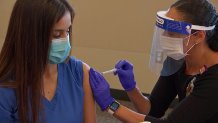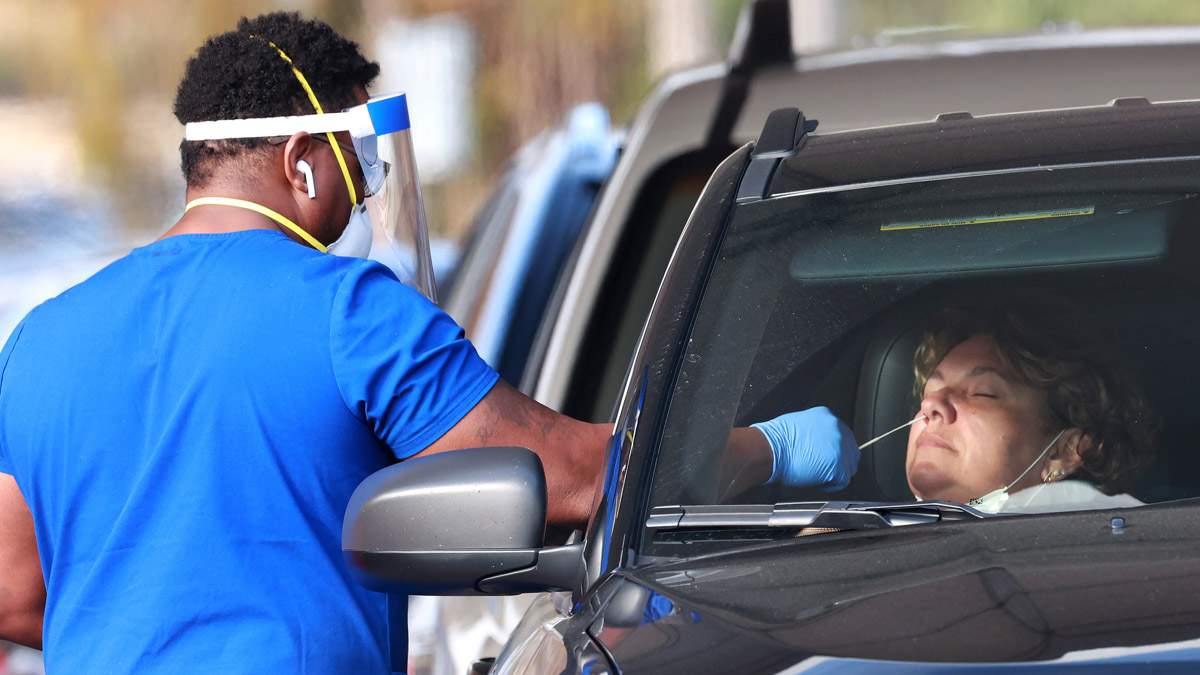Texas Gov. Greg Abbott says Texas should have received 224,000 doses of the Pfizer COVID-19 vaccine through Thursday and expects one million Texans to be vaccinated against the 2019 novel coronavirus by the end of the year as part of the largest vaccination campaign in U.S. history.
Abbott made the announcement Thursday morning while talking about the progress the state is making in distributing the COVID-19 vaccine. He said 95,000 doses of the Pfizer vaccine had been received at about 23 locations across the state through Wednesday and expected another 129,000 to arrive at 87 other locations Thursday.
COVID-19 Latest
The 110 locations currently receiving the vaccine are hospitals and medical schools. UPS will be the primary courier for the vaccine and will ultimately deliver it to roughly 7,000 providers around the state, including health care centers, clinics, pharmacies, freestanding emergency rooms, urgent care centers, long-term health care facilities, state hospitals and other state-supported centers.
The number of vaccines received is expected to increase next week when Abbott said the state could be receiving vaccines from both Pfizer and Moderna, should the latter receive approval from the Food and Drug Administration on Thursday.
Abbott said he expected to have more than 1 million Texans vaccinated against COVID-19 before the end of the year.
"Vaccines are transformational, but there are some people who do not want them so the vaccines in the state of Texas are voluntary. Never required. But we will have a keen focus on who will be first in line for these vaccines," Abbott said.
Dr. John Hellerstedt, commissioner of the DSHS, said the vaccines are a ray of hope, a light at the end of the tunnel, but that we're in a marathon and more work is to be done to get us across the finish line.

"These vaccines are proven safe and effective. I think that is something people should never forget," Hellerstedt said. "We should all be very hopeful, but we should also be very patient and understand that eventually, we don't just need one million vaccines, we need hundreds of millions of vaccinations. That is going to occur over the coming weeks and months."
Meanwhile, coronavirus cases and hospitalizations continue to rise across the Lone Star State. The Texas Department of State Health Services has reported nearly 40,000 new cases of the virus this week. According to researchers at Johns Hopkins University, there were 728.5 new cases per 100,000 people in Texas over the past two weeks.
The actual number of cases is believed to be far higher because many people haven't been tested and some who get the disease don't show symptoms.
Additionally, the DSHS reported 252 more fatalities Wednesday along with 9,528 people hospitalized statewide, including more than 2,700 in North Texas. After peaking to more than 10,500 hospitalizations in July, the number of people hospitalized with COVID-19 dropped to around 3,000 in September. Since that time it's been steadily climbing.
Abbott said Thursday that we must use every tool we have to reduce hospitalizations in the state, including wearing masks, practicing social distance and frequent hand-washing, but also he also encouraged the use of antibody therapy drugs designed to fight the virus.
"Get them off the shelf and into the people who need them so that they can recover and not have to stay in the hospital," Abbott said.
Intensive care units in some regions were at or near full capacity, according to the Texas Department of State Health Services. In Denton County, the public health department said on Wednesday there were only four empty ICU beds in the county and that hospital occupancy was near 74%.
Abbott said vaccines for the general public could be available by mid-March. He added that he will take the vaccine, but only at the appropriate time and that he wanted to make sure front-line health care workers received it first.
For most people, the coronavirus causes mild or moderate symptoms that clear up within weeks. But for others, especially older adults and people with existing health problems, the virus can cause severe symptoms and be fatal.
Get DFW local news, weather forecasts and entertainment stories to your inbox. Sign up for NBC DFW newsletters.
Abbott added that next week the DSHS will also begin reserving doses of COVID-19 vaccine for the federal Long-Term Care Pharmacy Partnership, a federal program to vaccinate residents and staff of long-term care facilities against COVID-19. The program is free of charge to facilities and sends staff and Pfizer vaccines from partnering Walgreens and CVS locations to these facilities to vaccinate residents and staff who volunteer to participate. Over 1,200 skilled nursing facilities and over 2,000 other long-term care facilities have signed up for this program — totaling more than 225,000 certified beds. The first vaccines included in this program will be provided to pharmacies the week of December 21, 2020, and the program will begin December 28, 2020.
"The Pharmacy Partnership for Long-Term Care Program will help the State of Texas facilitate safe vaccinations among some of our most vulnerable populations, and it will help us protect residents and staff of long-term care facilities from COVID-19," said Abbott in a statement on Dec. 11. "I thank the Centers for Disease Control and Prevention for offering this program free of charge to these facilities and for working alongside us to keep our communities safe."
Long-term care facilities that have not enrolled in the pharmacy program may choose to enroll with the Texas Department of State Health Services' (DSHS) Immunization Program to receive vaccines and vaccinate their own staff and residents or partner with a local pharmacy or other vaccine providers.


